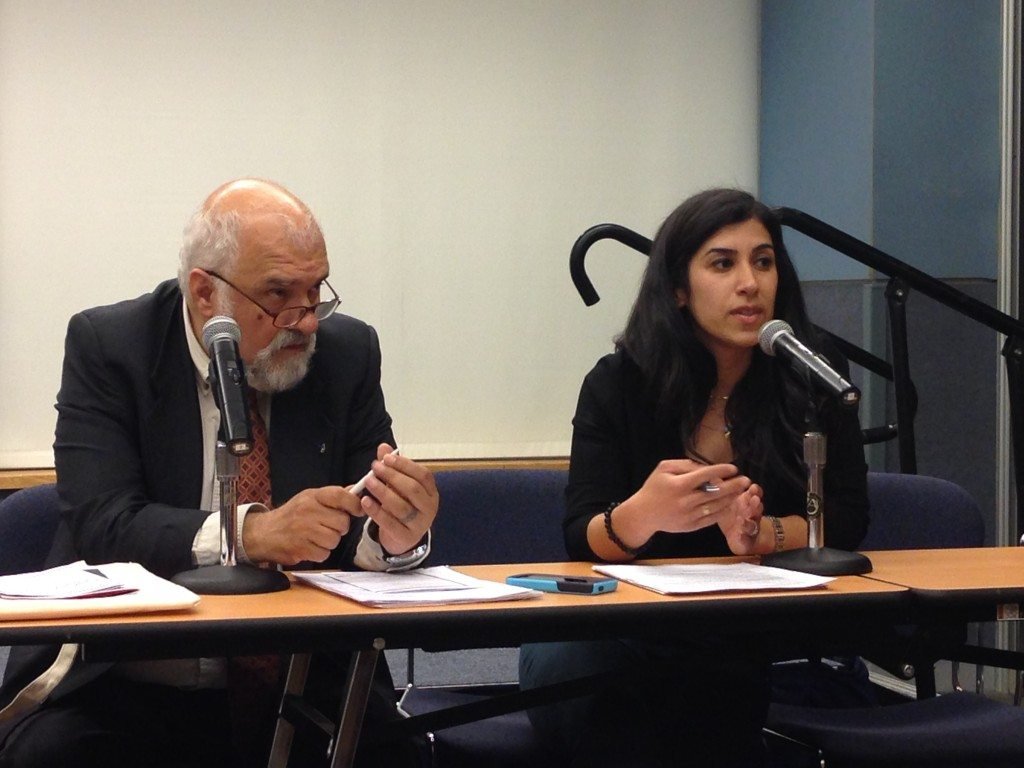Zarakolu, Barsoumian Discuss Turkey’s ‘Denial Industry’
MAHWAH, N.J.— A conversation between activist, writer, and publisher Ragip Zarakolu and Armenian Weekly editor Nanore Barsoumian was recently organized by the Gross Center for Holocaust and Genocide Studies in commemoration of the Centennial of the Armenian Genocide. The event, which was held at Ramapo College, focused on “The Denial Industry in Turkey,” that is, the continued denial of the Armenian Genocide through official and unofficial avenues in Turkey.
Following opening remarks by Michael Riff, director of the Gross Center, Ani Tchaghlasian, board member of the Gross Center, introduced the two discussants.

The conversation touched on the state-driven education system in Turkey that vilifies Armenians; the murder of Hrant Dink and its aftermath; the Dogu Perincek case; the recent “condolences” messages issued by the Turkish government; the reality in which Armenian identity has survived among descendants of survivors in Turkey; the different views among progressive intellectuals in Turkey about what justice might look like for the Armenians; the role of the media in recent years—from the days leading up to the murder of Hrant Dink to the present; and the exporting of denial.
Zarakolu has been subjected to a lifetime of harassment from Turkish authorities. He highlighted what he called a “memocide,” or the killing of memory—the prevailing atmosphere in Turkey when he first published a book on the Armenian Genocide—and spoke about the challenges he has faced for the work done through his publishing house.
Zarakolu graduated from college in 1968 and began writing for the magazines “Ant” and “Yeni Ufuklar,” which focused on issues of social justice in Turkey. In 1971, a military government assumed power in Turkey and instituted a crackdown on writers it deemed subversive. Following a conviction and a three-year prison sentence, Zarakolu steadfastly refused to abandon his campaign for freedom of thought, striving for an “attitude of respect for different thoughts and cultures to become widespread in Turkey.”
Eventually, Zarakolu turned his attention to Turkey’s denial of the Armenian Genocide, beginning in 2004 with his publication of the Turkish translation of British author George Jerjian’s book, The Truth Will Set Us Free: Armenians and Turks Reconciled. He was immediately prosecuted under Article 159 of the Turkish Penal Code, which made it illegal to “insult or belittle” various state institutions. That was replaced in March 2005 with the now-infamous Article 301, a new version of the insult law that conservative prosecutors have since used against dozens of writers, journalists, and publishers in Turkey.
Having been acquitted for the publication of several similar titles, in June 2008 Zarakolu was convicted of “insulting the state” under Article 301 for publishing Jerjian’s book. He was sentenced to a five-month prison term, which was subsequently commuted to a fine. He is appealing the conviction.
Barsoumian’s writings focus on human rights, politics, poverty, and environmental and gender issues. She has reported from Armenia, Nagorno-Karabagh, Javakhk, and Turkey.



Be the first to comment